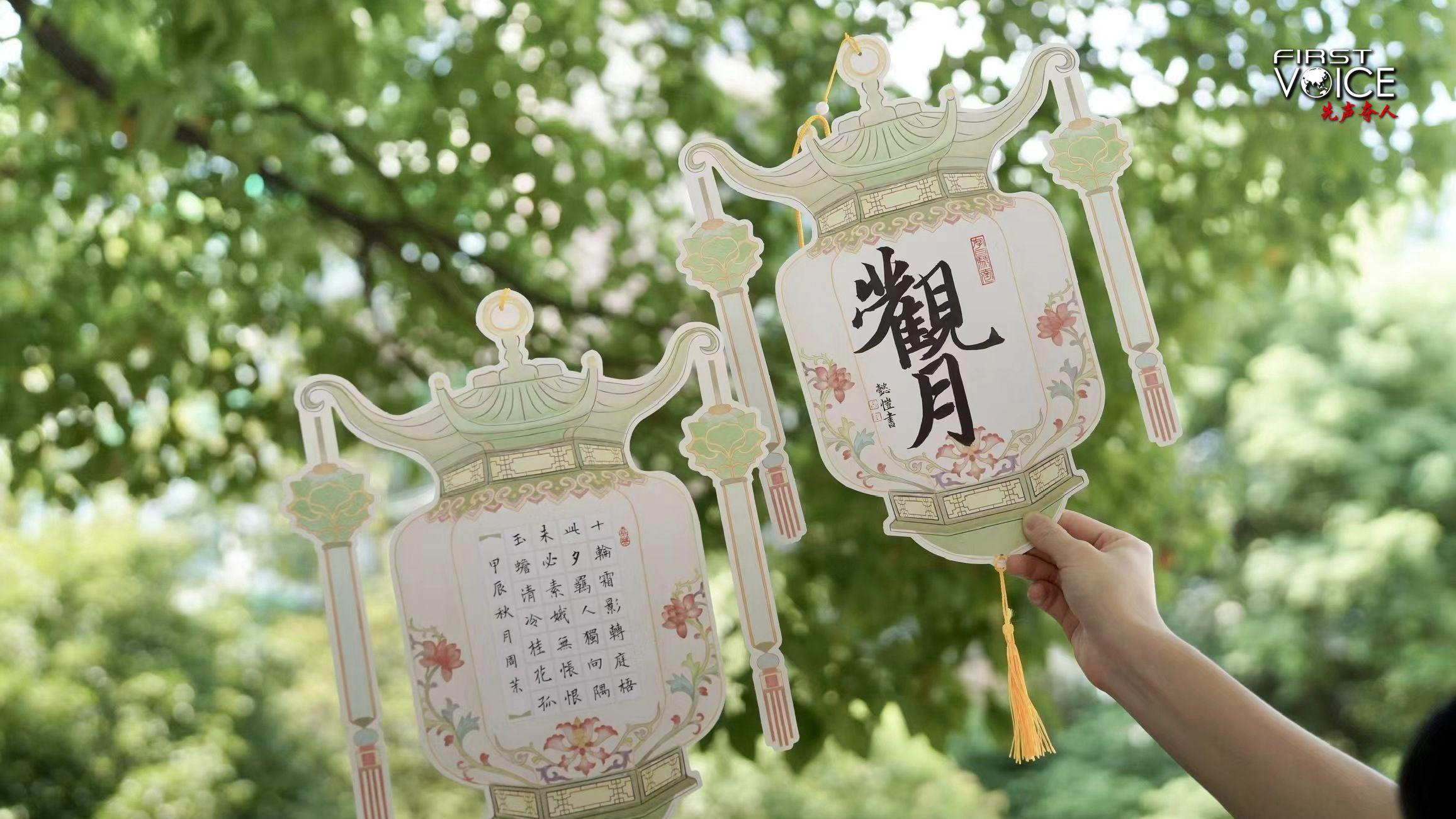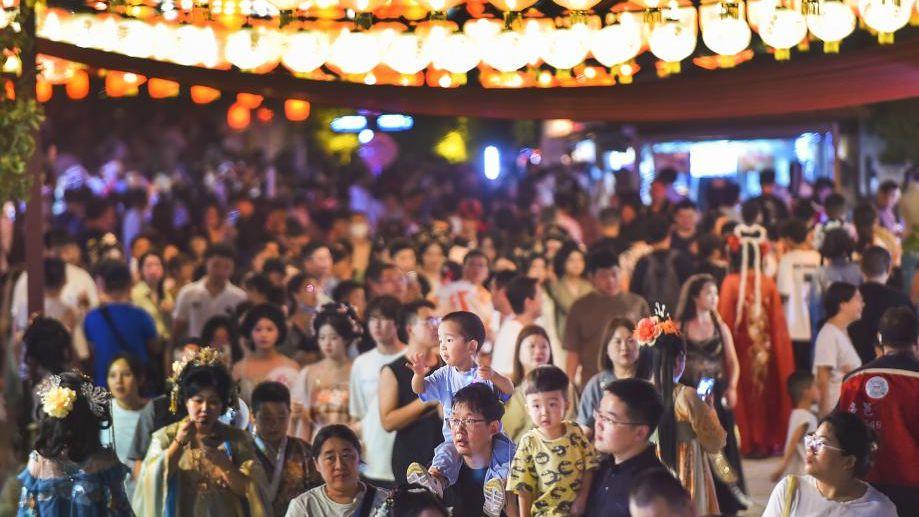
Ornament with calligraphy of Chinese poems about the moon for the Mid-Autumn Festival. [Photo/Xinhua]
Editor's note: CGTN's First Voice provides instant commentary on breaking stories. The column clarifies emerging issues and better defines the news agenda, offering a Chinese perspective on the latest global events.
By Liu Chunsheng
Despite critics of the Chinese economy, the country has shown significant economic vitality throughout this year's Mid-Autumn Festival holiday.
Sluggish holiday economy?
Travels surge during the three-day holiday. The single-day cross-regional people movement amounted to approximately 205 million on average, an increase of 28.2 percent from the same period in 2023, according to China's Ministry of Transport. On the first day alone, some 215.92 million passenger trips were handled by China's transportation sectors, up 37.9 percent year-on-year.
Apart from the travel surge, consumer confidence is on the rise and the Chinese market exhibited robust vitality, particularly in sectors such as catering, food and entertainment. Data from China's e-commerce platform Douyin shows an increase of 88 percent week-on-week increase in searches for "family reunion meals" from September 7 to 13, While service platform Meituan revealed a 433 percent increase in searches for "Mid-Autumn restaurants."
A series of consumer promotion activities have further stimulated market consumption levels. Some restaurants have even hired individuals to cosplay Chang'e, the goddess of the Moon in Chinese mythology, to deliver mooncakes to guests. Such cross-industry collaboration has not only celebrated Chinese tradition, but also fueled a strong recovery in the holiday economy.

A baker arranges freshly baked mooncakes at a workshop in Hepu County, south China's Guangxi Zhuang Autonomous Region, September 11, 2024. [Photo/Xinhua]
Consumption featuring traditional Chinese culture has become a trend during this year's festival, with mooncakes reaching peak sales. Against Western estimates of China's frosty mooncake sales, Douyin, according to southcn.com reports, revealed a 111 percent surge in group orders for mooncakes.
With innovative designs, mooncake-themed products have also secured impressive sales figures. The Palace Museum, as Xinhua reported, has sold more than 10,000 copies of the mooncake-shaped ornaments in its Taobao flagship store.
Collapsing Chinese economy?
These striking figures cannot thwart certain Westerners' China-discrediting efforts. Doubting the country's holiday economic performances, anti-China hawks have been repeatedly touting the "China collapse" theory – only to be slapped in the face.
Decades after the malicious-intentioned spread of the "collapse" theory, China, relying on firm reform determination and practical development measures, has achieved sustained high-speed economic growth, creating a miracle in the history of world economic development. Today, China has become the world's second-largest economy, the largest trading country in goods, and the largest foreign exchange reserve country, occupying a pivotal position on the global economic stage.
The strong resilience of China's economy means the country is capable of maintaining stability and quickly recovers when facing various risks and challenges. Such resilience is reflected in the country's huge domestic market. China has a population of more than 1.4 billion, with the middle-income group exceeding 400 million. This means its consumption market has huge potential.
In recent years, China has continuously promoted supply-side structural reform, actively expanded domestic demand, and promoted the upgrading of consumption, providing strong impetus for economic growth. Even against the backdrop of the complex and changing global economic situation and weakened external demand, China's domestic consumption market still maintains stable growth and has become the "ballast stone" of economic development.

Tourists visit the Luoyi ancient city in Luoyang, central China's Henan Province, September 16, 2024. [Photo/Xinhua]
The resilience is also reflected in the country's complete industrial system. China is the only country in the world that has all the industrial categories in the United Nations industrial classification. From traditional manufacturing to high-end equipment manufacturing, from agriculture to modern service industries, China's industrial system is complete and its industrial chain and supply chain are stable. This enables China to quickly adjust production layout and ensure the normal operation of the economy when facing external shocks.
Technological innovation is a powerful engine for China's economic development. For decades, China has attached great importance to technological innovation and has been continuously increasing R&D investment. This explains China's remarkable achievements in fields such as artificial intelligence, 5G communication, high-speed rail technology, and e-commerce.
Chinese high-tech enterprises including Huawei, ByteDance, and Tencent not only dominate the domestic market but are also actively expanding overseas markets, becoming global leaders in technological innovation. This technological innovation not only promotes the transformation and upgrading of China's economy but also injects new impetus into global economic growth.
China's high-level opening-up has made important contributions to world economic development. The Belt and Road Initiative (BRI), for instance, has strengthened trade and investment cooperation among BRI participating countries, promoting economic integration in the region. China also holds a host of international exhibitions including the China International Import Expo, China International Fair for Trade in Services, and the Canton Fair, providing a broad market and cooperation opportunities for countries across the world.
China's active participation in global economic governance has promoted the construction of an open economy, demonstrating its responsibility as a major country in the world.
West's anti-China bias
Since the early days of China's reform and opening-up, some Western forces have been signaling the decline of the Chinese economy. When China's economy faces challenges in its structural transition, these Westerners spread the theory of a "China Collapse;" When China's economy is rapidly developing, the same Westerners start to propagate the theory of a "China Threat." However China acts, it is always the target of Western criticisms.
Do these Westerners really care about China's development and Chinese people? Absolutely not! These anti-China hawks are adept at disdaining China when it was poor and discrediting the country when it grows.
This, on the one hand, is out of ideological biases. Having played a dominating role in the global arena, some Westerners are unwilling to see China's growth and thus have been attempting to contain its development. Signaling a decline of the Chinese economy, in their view, may dampen investors' confidence in the Chinese market. On the other hand, certain Westerners, influenced by some interest groups, deliberately attempt to create panic for the sake of selfish interests.
Whatever their purpose is, their malicious-intentioned claims regarding the Chinese economy are completely unfounded. True, the Chinese economy faces some challenges, but this does not equate to a crippled competitiveness. China has a resilient economy and its performance during the three-day Mid-Autumn Festival has exemplified this.
The author Liu Chunsheng is an associate professor at the Beijing-based Central University of Finance and Economics.

 中文
中文



